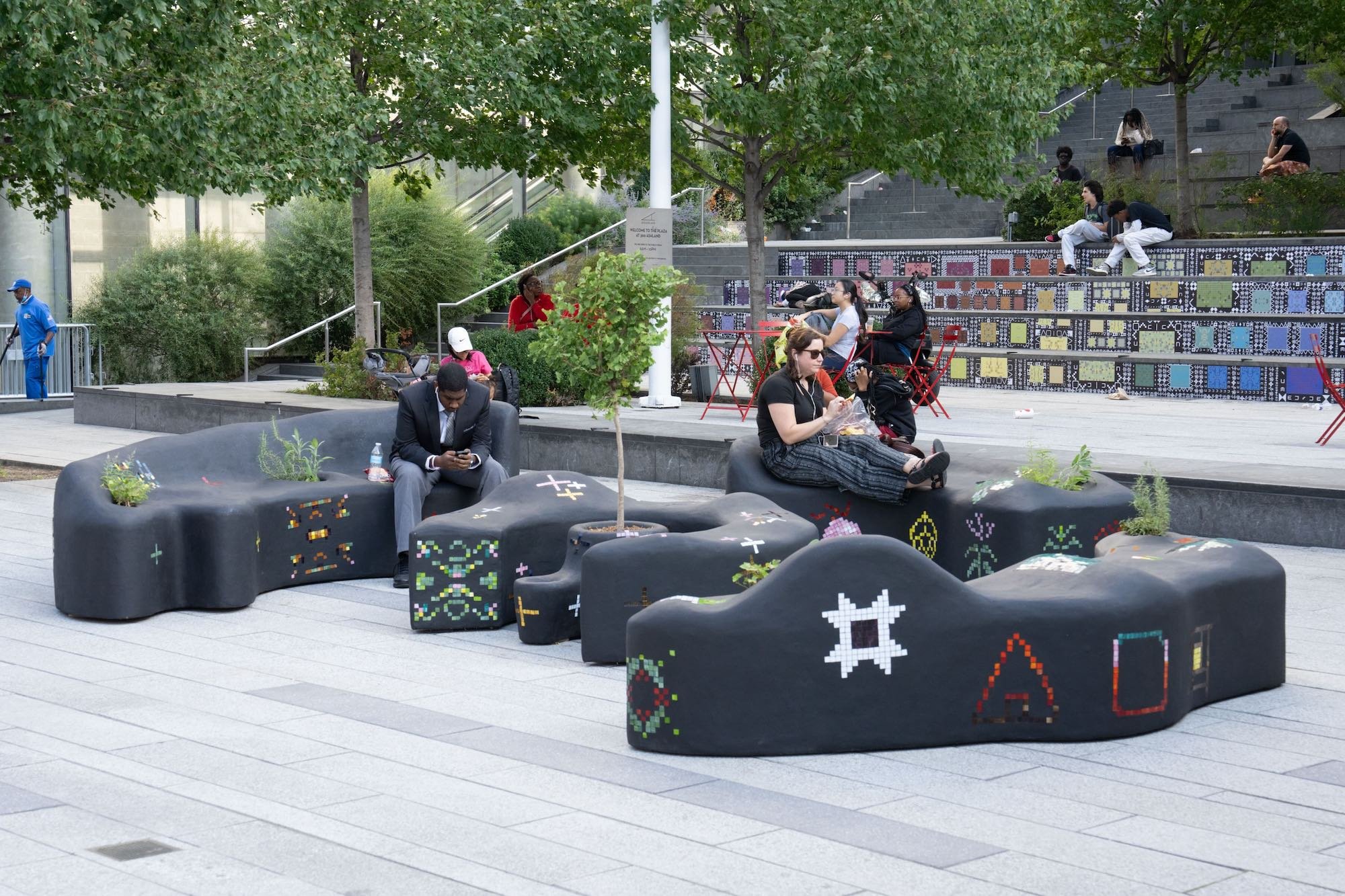Sit and Stay Awhile at This Art Installation in Downtown Brooklyn
At the Plaza at 300 Ashland Place in downtown Brooklyn, pedestrians curiously interact with a collection of puzzle piece-like sculptures. A skateboarder takes a break from kickflips to lean on one of the benches and check their phone. Another person flings himself on a bench, legs and arms splayed out as if he were watching a football game on TV. “This is the dopest seat I’ve ever seen,” he remarks to another individual sitting across from him. In Jonathan Lee’s 2021 essay “The Park Bench Is an Endangered Species,” he writes, “Like a good book or piece of music, a park bench allows for a sense of solitude and community at the same time, a simultaneity that’s crucial to life in a great city.” The sculptures at the plaza certainly meet Lee’s criteria, adding communal seating to an area otherwise populated by individual (and far less comfortable) chairs, but they are more than just public furniture.
These benches are a new art installation by artists Kite and Alisha B. Wormsley, providing passersby with a space for repose amid a bustling avenue. Composed of four curved black benches, one vessel, and vinyl mosaics on the steps behind the plaza, Cosmologyscape, presented by Creative Time, physically manifests dreams. Those who don’t stop to read the sign explaining the artwork as they rush into Whole Foods or meander past after a show at the Brooklyn Academy of Music might easily take the work for granted, unaware that this public installation is the product of the artists’ nearly five-year-long practice exploring the dream realm through workshops, public programs, and a participatory website.
Drawing from Lakota visual language and Black quilting traditions, the tile patterns that wrap the benches and adorn the vinyled steps are not arranged randomly; rather, they emerge from an Indigenous A.I. framework programmed to translate submitted dreams. Even the slopes and peaks of the plant-sprouted benches are algorithmically generated from recounted dreams. Each sculpture represents a pillar of the dream interpretation practice that Wormsley describes as journey, prayer, sanctuary, and offering. Indeed, the benches create an oasis within a largely commercial urban hub, all arranged around a center pot holding a ginkgo tree. “Oppressed people in this country are constantly reacting to the oppression that is put on them,” says Wormsley. “Where is the space for us to be able to imagine a world that's better if we're always reacting to the stress?”
Hostile architecture runs rampant in New York, creating a divide between those who have the privilege of restful sleep and those who do not. Backless benches, seats segmented by armrests, or a complete lack of seating unless paid for make it difficult for commuting or unhoused people to find repose in the city. While there are no laws against sleeping in public, it’s not uncommon to see cops prodding someone sleeping in a subway station up and out of the space. According to the Coalition for the Homeless, Black New Yorkers are disproportionately affected by homelessness; about fifty-six percent of heads of households in shelters are Black. Though Cosmologyscape can’t solve the city’s homelessness crisis, Kite says she views the benches as “a prayer for a future where Black and Indigenous communities’ basic human rights are met.” Both visually and conceptually, the gentle fluidity, plant life, and colorful mosaic motifs of these unsegmented and organic forms stand in overt opposition to New York City’s hard, bare public seating.
But this is not a future that can be dreamed of in isolation. The communal solitude Lee elevates in his essay—an acknowledgment of others’ existence within a shared space—is imperative to imagining a world where everyone is afforded the right to rest, something which the participatory nature of the Cosmologyscape benches encourages. Though the artists created these benches, this project in its entirety would not exist without the contributions of many other dreamers or public interaction. Cosmologyscape carves out a communal sanctuary for individuals to pause for a moment or longer and invites respite in a display of hospitable design—no cops to hurry dreamers along.
For six weeks, Cosmologyscape will bring an opportunity to rest to the people of New York City. The installation will close November 3, 2024.



